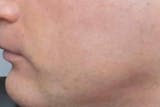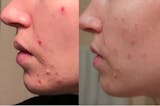Distinguishing skin infections from eczema symptoms can be challenging and misdiagnosis can delay healing.
Elevated levels of S. aureus on the skin are common in eczema sufferers but do not necessarily indicate infection.
Eczema is a common skin condition that affects people of all ages. Manifesting as patches of dry, itchy, and inflamed skin, eczema can significantly impact a person's quality of life.
Skin infections can be a significant concern for those who suffer from eczema as they are more common for individuals with eczema and they can make eczema symptoms worse. (Mind)(BYR 2018)
Additionally, they can sometimes be hard to distinguish from some standard eczema symptoms and treating eczematous skin for infections when there is none present can be costly and even slow the healing process.
In this article, we will discuss the symptoms of skin infections, their impact on eczema, and how to prevent and treat them to help you better manage your eczema symptoms.
Caution: Your Skin Needs a Microbiome
Before we delve deeper into the specifics of eczema infections, it is vital to understand the critical role that your skin's microbiome plays in maintaining your skin health.
The skin microbiome refers to the community of microorganisms, including bacteria, fungi, and viruses, that reside on the surface of our skin.(SEN 2016) This might sound alarming, but the presence of these microorganisms is entirely normal and, in fact, beneficial for our skin health.
The key functions of a healthy skin microbiome include:
Infection resistance
Skin barrier strength
Modulation of immune responses
Promotion of skin homeostasis
Wound healing
We dive deep into how the microbiome helps those with eczema heal their flares here. Suffice to say though, given the above list, keeping the microbiome healthy is important to those with eczema.
An infection occurs when “pathogenic” microorganisms overwhelm the skin’s native microbiome and invade the body's tissues causing damage to the cells of the body.(ALY 1996)
While people with eczema often have elevated levels of S. aureus on their skin, and their flares will have even higher levels of S. aureus, it is not an infection simply by being elevated.(LUS 2021)
Below we give you some tools for identifying if you have an infection and some tips on what you can do about it.
It is important to always follow your doctor’s advice.
JUMP TO SECTION:
What Are The Symptoms of a Skin Infection?
When an infection takes hold in an area of skin affected by eczema, the symptoms can be quite noticeable. The skin might become more red and swollen than usual, and it may feel warm or hot to the touch.
You may also notice pus-filled blisters or a yellowish crust forming on the skin's surface. Infected skin can also be very tender or painful, and you may experience a fever or flu-like symptoms.
In general, the symptoms of a skin infection include:
Hot, red, and sore skin
Weepy/yellowish crust
Puss
Swollen skin
Folliculitis (red, pus-filled dots around hair follicles)
Tender, swollen glands in the neck, groin, and/or armpits
Differences Between Eczema Symptoms and An Infection
While eczema can cause symptoms such as redness, dryness, and itching, an infection generally exacerbates these symptoms and introduces new ones. Non-infected eczema won't typically cause fever or flu-like symptoms, and it's less likely to result in extreme redness, warmth, or tenderness of the skin.
What About Infected Eczema?
Eczema infections refer to the occurrence of a secondary infection—bacterial, viral, or fungal—in the skin already affected by eczema. Eczematous skin has a weakened skin barrier, leaving it more vulnerable to infection. Scratching and certain treatments, such as topical steroids, can further weaken the skin.
Eczema does not make individuals more susceptible to infections with resistant strains of bacteria.(HUA 2009)
General symptoms of infected eczema include a new itch, warmth, fever, be painful to touch, increased scaling, fluid in the area, and swelling.
How to Recognize and When to Seek Medical Help
If you notice your eczema symptoms worsening dramatically, or if you start experiencing fever, fatigue, or increased pain in your skin, these could be signs of an infection. If you suspect an infection, it's crucial to seek medical help immediately to prevent the infection from spreading or worsening your eczema.
It is generally better to err on the side of caution when it comes to infections, as untreated skin infections can lead to more serious complications.
Weeping Eczema
Infected weeping eczema, also known as wet or vesicular eczema, is a type of eczema infection where the skin becomes moist and oozes fluid. This usually happens when bacteria infect an area of skin affected by eczema.
The weeping, combined with the itchiness of eczema, can make this type of infection particularly uncomfortable. Moreover, the fluid can spread bacteria to other areas of the skin, leading to further infections.
How Do Infections Impact Eczema?
Infections can significantly worsen the symptoms of eczema, making management of the condition more challenging. They can intensify itching and inflammation, leading to increased discomfort and distress. The presence of an infection can also trigger a more severe eczema flare-up.
Moreover, infections can disrupt the skin's barrier function even further, making the skin more susceptible to future infections and causing a vicious cycle of eczema flare-ups and infections.
How to Avoid Infected Eczema
To prevent infected eczema, prioritize avoiding contamination, proper washing techniques, and maintaining a healthy immune system. Supporting a robust skin barrier is also crucial.
Washing
Maintaining cleanliness is crucial in managing eczema, but it is equally important to do it right. Regular washing, even during severe eczema flare-ups, can help remove irritants and allergens that may trigger symptoms. However, it's essential to use gentle, non-irritating soaps to preserve the skin's natural acidity and prevent further damage.
For an in-depth understanding of the best practices for washing with eczema, refer to our dedicated article on washing when you have eczema. This resource provides comprehensive guidelines to help you maintain skin cleanliness without exacerbating your eczema symptoms.
Avoid Scratching
Eczema is intrinsically linked to a higher risk of skin infections due to several reasons. The impaired skin barrier function, a characteristic of eczema, allows easier penetration by pathogens.
The constant itching and scratching associated with eczema can also lead to open sores, providing an entry point for bacteria, fungi, and viruses.
We offer some tips to avoid scratching in our non-medical treatments article.
Maintain a Healthy Microbiome & Skin Barrier
A healthy skin microbiome and a robust skin barrier are critical in managing eczema and preventing infections. Achieving this requires a diligent skincare routine that supports a healthy microbiome, including the use of fresh, high-quality skincare products. Out-of-date products can harbor harmful bacteria that disrupt the skin's natural balance.
Furthermore, consider using products that restore long chain ceramides, which are often lacking in individuals with eczema. These substances play a key role in maintaining the skin's barrier function.
For a comprehensive guide on how to select and use moisturizers to support a healthy skin barrier, refer to our detailed moisturizers for eczema article.
Healthy Immune System
Supporting your immune system is essential in managing eczema and preventing infections. A balanced, nutritious diet is a cornerstone of a strong immune system. Check out our comprehensive article on diet and nutrition to learn more about the best foods for boosting immunity in the context of eczema.
Stress can also negatively impact your immune system, making stress management techniques crucial. To understand how to manage stress effectively, refer to our insightful article on mental health.
Additionally, regular exercise can promote a healthy immune system and overall wellbeing. While exercising with eczema can present unique challenges, our dedicated article on exercising with eczema offers useful tips to help you maintain an active lifestyle while managing your skin condition.
Best Practices For Treating Infected Skin
When dealing with infected eczema, seeking professional medical advice is paramount. If you suspect an infection, consult with your healthcare provider promptly.
Ensure you follow their prescribed treatment plan meticulously, taking all medications as scheduled. It is important to clean the infected area thoroughly yet gently, to remove any potential irritants or pathogens.
After cleaning, keep the area dry and consider using a protective dressing to prevent further irritation or infection. Your healthcare provider will guide you through this process to ensure the best outcome.
What Now?
Dealing with skin infections and eczema symptoms involves recognizing the symptoms of infection, understanding the impact on eczema, and learning how to prevent and treat infections. By following the advice and techniques outlined in this article, you can manage your eczema more effectively. For more information on related topics, explore articles on visiting doctors, washing techniques, and using topical steroids.
While eczema can be a difficult condition to live with, remember that you're not alone, and help is available. Never hesitate to seek medical advice if you're experiencing concerning symptoms or if your eczema becomes difficult to manage. With the right knowledge, support, and treatment, you can effectively manage eczema and maintain healthy skin.
Share your experiences with us! Tell us what has and hasn’t worked for you. What did we miss in this article that you've found personally impactful? Your insights can help others better understand and manage their eczema.



